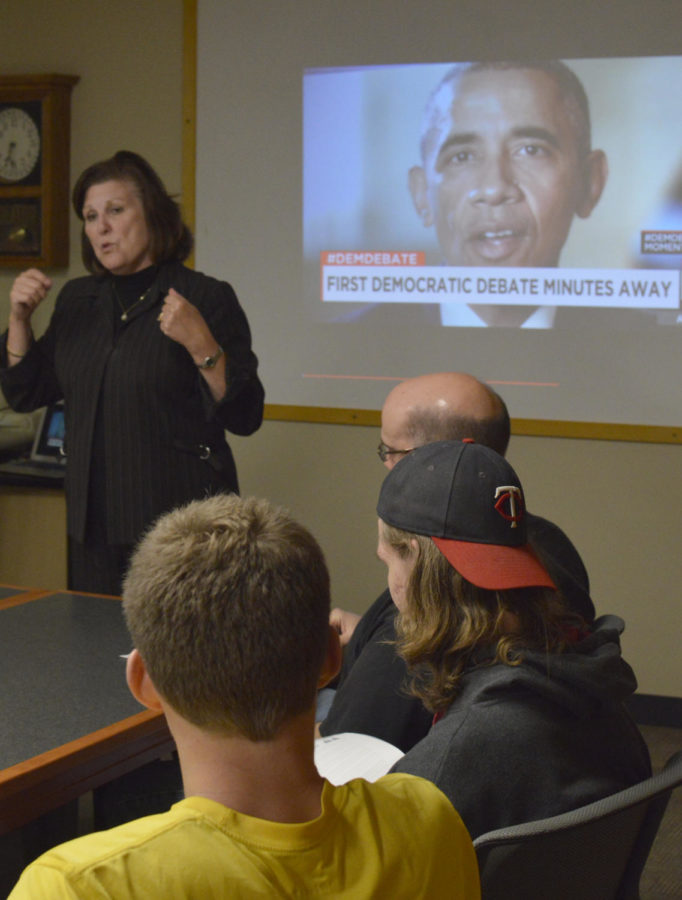Democrats have first chance to debate on national stage
Dianne Bystrom, director of the Carrie Chapman-Catt Center, introduces students to the 2015 Democratic Presidential Debate. Bystrom held a watch party at Hamilton Hall on Tuesday
October 13, 2015
Democratic candidates for president debated for the first time Tuesday night, with eyes on the top two candidates — Hillary Clinton and Bernie Sanders. But attention was also paid to the other candidates to see if they could have a “breakout” moment.
On stage in Las Vegas were five candidates — Clinton, Sanders, Martin O’Malley, Jim Webb and Lincoln Chafee — all seeking the Democratic nomination for president.
CNN hosted the two and a half hour debate, which included a discussion of current news items and other policy positions. Leading up to the debate, however, most coverage focused on how the candidates would interact for the first time on a national stage.
“I think O’Malley’s name recognition might go up, and I think he scored some points,” said Steffen Schmidt, university professor of political science. “Webb and Chafee really didn’t do themselves much good. They came across as marginal and unable to really interject themselves in the whole discussion.”
Dianne Bystrom, director of the Carrie Chapman Catt Center, said she thinks O’Malley stood out and had a good closing statement, but Clinton and Sanders probably took the most attention at the debate.
“I think O’Malley did better than [Chafee and Webb],” Bystrom said.
As for Clinton and Sanders, Schmidt said he thinks they did “terrific” when it comes to their debate performance.
“They’re talking to different parts of the Democratic Party, and they probably reinforced the support that they have been getting from different segments,” Schmidt said.
Before debate on specific policy issues, a series of newsworthy items was discussed, and Clinton was asked about the issue that has taken up most of the headlines: her emails.
“I’ve taken responsibility, and it was a mistake,” Clinton said, but she also added that the Benghazi committee in Congress “is a political arm of the [Republican National Committee].”
“I’m still standing and will continue to talk about issues important to the American people,” Clinton said.
Sanders got a huge applause when he responded during the email questions, saying the American people are “sick and tired of hearing about your damn emails” and that Americans are more concerned about the collapsing middle class.
Sanders was asked about his record on gun control, which some have questioned recently and accused him of having too much of a pro-gun record. In response, Sanders said his D- record from the National Rifle Association and support for universal background checks and a ban on assault weapons proves he is serious on gun safety.
When asked if Sanders’ record on gun control was strong enough, Clinton replied, “No, not at all.”
O’Malley told a story of a family in attendance whose daughter was killed during a mass shooting on Aurora.
Clinton and O’Malley said Democrats must stand up to the NRA and special interests, and Sanders said his rural, pro-gun state is the reason for several specific votes that could be considered pro-gun.
The discussion comes just two weeks after almost a dozen people were killed in a mass shooting in Oregon, which tipped off discussions on gun control again.
Webb was the only one on stage to take somewhat of a pro-gun record, saying American’s should have the right to defend themselves just like “high-ranking” officials in government have bodyguards.
“All the shouting is not going to do what I hope all of us want,” Sanders said, adding again he supports tighter restrictions.
During a discussion on foreign policy, Chafee, O’Malley and Sanders piled onto Clinton for a vote in favor for the Iraq war. There was a discussion in detail about when the United States should go to war and what sort of role the country should play in the world, with Sanders and O’Malley calling for a less aggressive foreign policy.
When asked about Wall Street regulations, Clinton said she supports regulations to reign in big business and big banks, which then caused some pushback from Sanders and O’Malley, who said their plans are stronger on protecting the middle class.
Candidates agreed for the most part on things like climate change regulations, criminal justice reform and paid family and sick leave.
The debate Tuesday came after two Republican debates, the next of which is scheduled for Oct. 28. The Democrats are scheduled to debate again on Nov. 14 in Des Moines.







